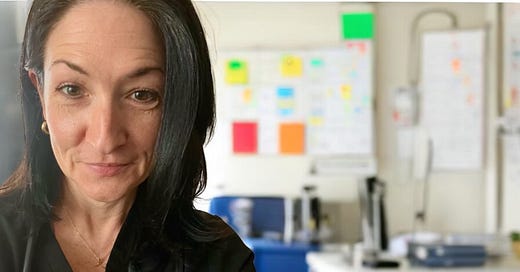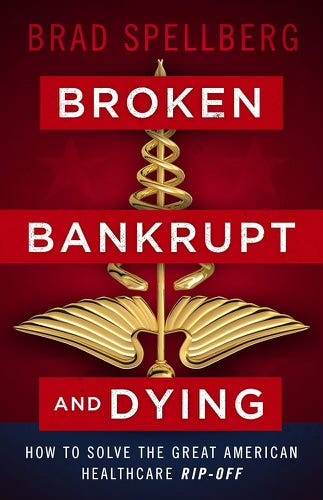When Dr. Amber Hull reflects on her U.S. healthcare system journey —first as a patient and then as a physician—her story is both an indictment of a broken system and a testament to the resilience of one’s human spirit.
A Board-Certified Osteopathic Physician practicing Direct Primary Care (DPC) pediatrics in Las Vegas, Dr. Hull has experienced the medical-industrial complex from multiple vantage points: healer, advocate, and victim.
Her path was forever altered in April 2021 when a pathological femur fracture left her disabled for the remainder of the year. This personal health crisis, compounded by the corporate grind of the U.S. medical system, forced Dr. Hull to reevaluate not only her career but her very relationship with medicine.
“It was as if my body was revolting against the toxic circumstances under which I’d been practicing,” she shares, noting how stress, emotional distress, and moral injury took a toll on her physical and mental health.
Despite holding platinum-level health insurance, the ordeal left her physically and financially devastated. It also illuminated a stark truth about American healthcare: the system often fails even its most informed and connected users. Yet, for Dr. Hull, this crisis became a crucible for transformation.
“I overhauled my lifestyle,” she explains, detailing how she lost 50 pounds, eliminated processed foods, became alcohol-free, and reclaimed her health. This personal renaissance extended to her professional life as she left the corporate “meatgrinder” to launch her own DPC pediatrics practice. In this model, patients pay a transparent monthly fee for unlimited access to care, freeing her to provide personalized attention without the interference of insurance companies.
The Flaws in the System
Dr. Hull is unflinching in her critique of the U.S. healthcare system. “Health insurance companies have nothing to do with the actual delivery of medical care,” she states, highlighting how they act as financial intermediaries siphoning billions while denying claims—often through AI tools designed to reject coverage en masse.
Her anecdotes reveal the absurdities and injustices that define the American medical experience. In one case, a lab billed her pediatric patient’s family $550 for tests that should have cost $125 under her negotiated cash-pay discount. It took her six months of relentless advocacy to reverse the charges.
This relentless bureaucracy erodes trust between patients and providers, Dr. Hull argues. The profit motives of insurers and pharmaceutical companies, coupled with political leaders’ financial ties to these industries, perpetuate a system designed more for revenue generation than healing.
Human Connection in an Era of Automation
Amid the rise of technology-driven solutions in medicine, Dr. Hull emphasizes the irreplaceable value of human connection. “The true practice of medicine is the most intimate and vulnerable experience that one can share with another person,” she says.
Her DPC model allows her to foster trust and familiarity with families, something increasingly rare in a landscape dominated by 10-minute consultations and automated diagnostics.
Yet, she acknowledges the tension between innovation and authenticity. While tools like AI have transformative potential, they can also “muck up the science with AI slop,” she warns, urging caution in their implementation.
A Systemic Problem
For Dr. Hull, the root cause of America’s healthcare woes is systemic. “The entire American economy is dependent on money that flows from the for-profit healthcare industry,” she observes, pointing to how campaign finance laws and corporate lobbying have entrenched this model. She believes that a radical overhaul is needed, starting with reforms to campaign finance laws that would limit the influence of corporate money.
A Comparative Lens: The Book “Broken, Bankrupt, and Dying” by Dr. Brad Spellberg
In Broken, Bankrupt, and Dying: How to Solve the Great American Healthcare Rip-off, Dr. Brad Spellberg offers a damning critique of the U.S. healthcare system, much like Dr. Hull. Spellberg’s book meticulously documents inefficiencies, skyrocketing costs, and the system’s failure to deliver equitable care, drawing comparisons with other nations to demonstrate how America’s outcomes lag despite its exorbitant spending.
Where Spellberg and Hull align is in their diagnosis of the system’s flaws: both emphasize the corrosive influence of profit motives and the dire need for systemic reform. Spellberg’s call for culturally appropriate, non-partisan solutions resonates with Dr. Hull’s vision for equity-driven change, particularly her advocacy for cash-pay models and transparent pricing as interim solutions.
However, there are points of divergence. Spellberg advocates for a single-payer system akin to those in other developed countries, arguing it would deliver better outcomes at lower costs.
Dr. Hull, while sympathetic to the idea, remains skeptical of its feasibility within the American cultural and political context. “We cannot talk about universal healthcare without first addressing campaign finance law,” she asserts, suggesting that meaningful reform is unlikely without dismantling the financial interests underpinning the current system.
The Way Forward
Dr. Hull’s journey offers a microcosmic view of what’s possible when physicians reclaim autonomy and prioritize patient-centered care. Yet, as she acknowledges, the DPC model is not a panacea. Its reliance on cash payments limits access for many, underscoring the need for broader systemic reforms.
Spellberg’s book provides a roadmap for these reforms, offering actionable solutions that could pave the way for a more equitable, efficient, and humane healthcare system.
For Dr. Hull, the challenge is not merely technical but cultural and political. The question remains: can Americans muster the collective will to untangle the web of profit-driven interests that have ensnared their healthcare system?
As Dr. Hull sees it, the stakes couldn’t be higher. “All of us non-billionaires are in the same sinking ship of exploitation by oligarchs,” she warns, urging collective action to create a system that serves the many rather than the few.
Her story, like Spellberg’s book, is a call to arms—one that challenges us to envision and demand a better future for American healthcare.
Would you be kind enough to consider contributing to my independent writing journey via the “subscribe” button above?
Or you can tip me some coffeehouse love here ( I am a dirty chai fan ).
Your support will be most appreciated as this is my full-time work! In the meantime, stay thirsty for a great book.
Diamond-Michael
Independent Journalist and Global Book Ambassador










This is the thesis that should serve as a model for reform of our political-financial system. But, humans are too retarded by money, ambition and greed to accept responsibility for the action we call change. Many more people will die. It remains to be answered, Who is the real murderer here?